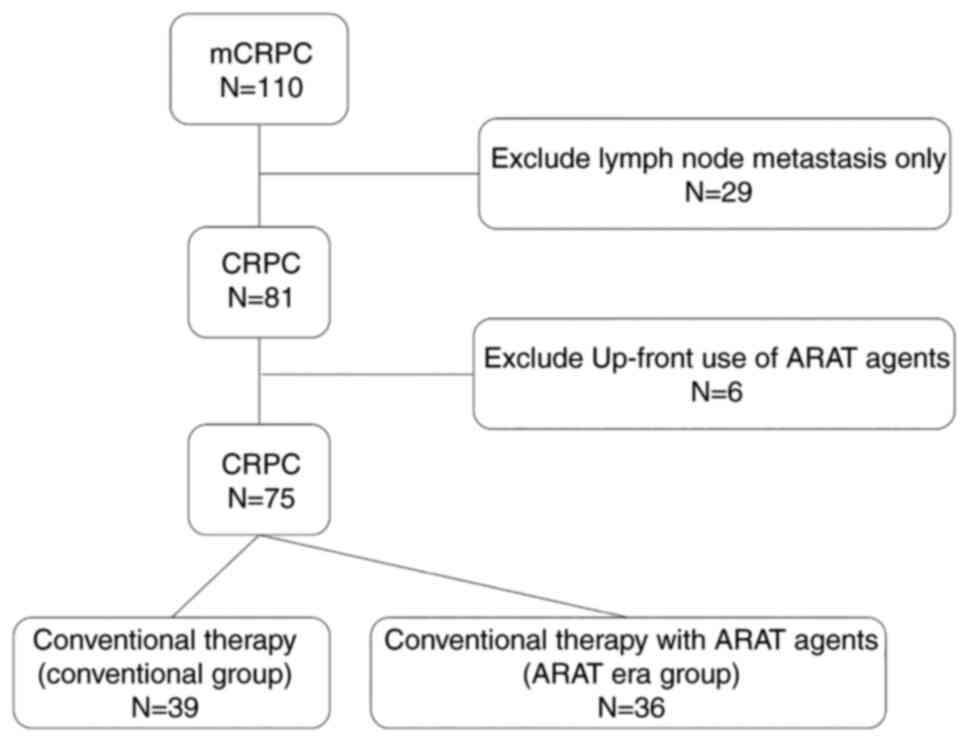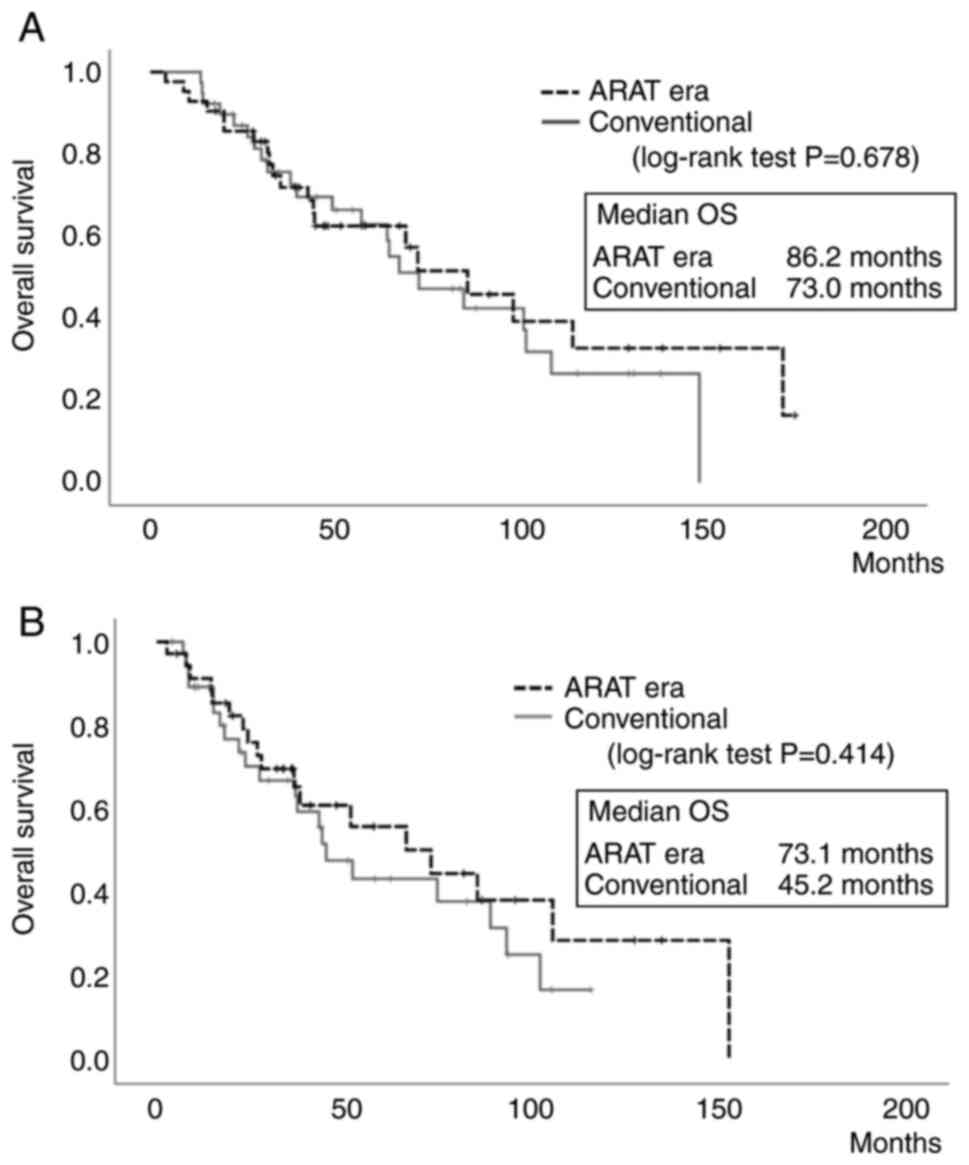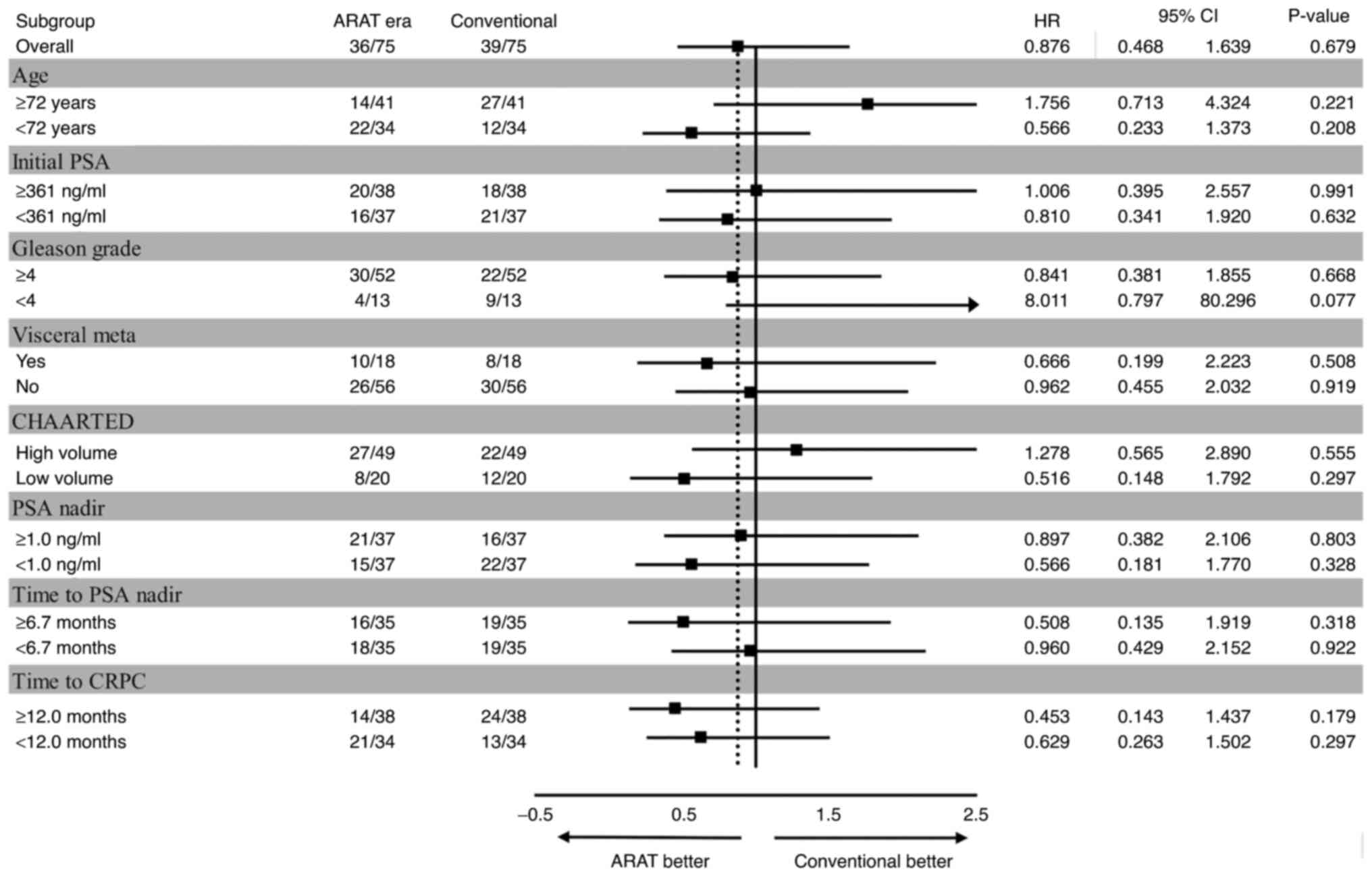|
1
|
Beer TM, Armstrong AJ, Rathkopf DE, Loriot
Y, Sternberg CN, Higano CS, Iversen P, Bhattacharya S, Carles J,
Chowdhury S, et al: Enzalutamide in metastatic prostate cancer
before chemotherapy. N Engl J Med. 371:424–433. 2014. View Article : Google Scholar : PubMed/NCBI
|
|
2
|
Scher HI, Fizazi K, Saad F, Taplin ME,
Sternberg CN, Miller K, de Wit R, Mulders P, Chi KN, Shore ND, et
al: Increased survival with enzalutamide in prostate cancer after
chemotherapy. N Engl J Med. 367:1187–1197. 2012. View Article : Google Scholar : PubMed/NCBI
|
|
3
|
Ryan CJ, Smith MR, de Bono JS, Molina A,
Logothetis CJ, de Souza P, Fizazi K, Mainwaring P, Piulats JM, Ng
S, et al: Abiraterone in metastatic prostate cancer without
previous chemotherapy. N Engl J Med. 368:138–148. 2013. View Article : Google Scholar : PubMed/NCBI
|
|
4
|
de Bono JS, Logothetis CJ, Molina A,
Fizazi K, North S, Chu L, Chi KN, Jones RJ, Goodman OB Jr, Saad F,
et al: Abiraterone and increased survival in metastatic prostate
cancer. N Engl J Med. 364:1995–2005. 2011. View Article : Google Scholar : PubMed/NCBI
|
|
5
|
Armstrong AJ, Szmulewitz RZ, Petrylak DP,
Holzbeierlein J, Villers A, Azad A, Alcaraz A, Alekseev B, Iguchi
T, Shore ND, et al: ARCHES: A randomized, phase III study of
androgen deprivation therapy with enzalutamide or placebo in men
with metastatic hormone-sensitive prostate cancer. J Clin Oncol.
37:2974–2986. 2019. View Article : Google Scholar : PubMed/NCBI
|
|
6
|
Davis ID, Martin AJ, Stockler MR, Begbie
S, Chi KN, Chowdhury S, Coskinas X, Frydenberg M, Hague WE, Horvath
LG, et al: Enzalutamide with standard first-line therapy in
metastatic prostate cancer. N Engl J Med. 381:121–131. 2019.
View Article : Google Scholar : PubMed/NCBI
|
|
7
|
Fizazi K, Tran N, Fein L, Matsubara N,
Rodriguez-Antolin A, Alekseev BY, Özgüroğlu M, Ye D, Feyerabend S,
Protheroe A, et al: Abiraterone plus prednisone in metastatic,
castration-sensitive prostate cancer. N Engl J Med. 377:352–360.
2017. View Article : Google Scholar : PubMed/NCBI
|
|
8
|
Akaza H, Hinotsu S, Usami M, Arai Y,
Kanetake H, Naito S and Hirao Y: Combined androgen blockade with
bicalutamide for advanced prostate cancer: Long-term follow-up of a
phase 3, double-blind, randomized study for survival. Cancer.
115:3437–3445. 2009. View Article : Google Scholar : PubMed/NCBI
|
|
9
|
Okegawa T, Nutahara K and Higashihara E:
Alternative antiandrogen therapy in patients with
castration-resistant prostate cancer: A single-center experience.
Int J Urol. 17:950–955. 2010. View Article : Google Scholar : PubMed/NCBI
|
|
10
|
Hirano D, Minei S, Kishimoto Y, Yamaguchi
K, Hachiya T, Yoshida T, Yoshikawa T, Endoh M, Yamanaka Y, Yamamoto
T, et al: Prospective study of estramustine phosphate for hormone
refractory prostate cancer patients following androgen deprivation
therapy. Urol Int. 75:43–49. 2005. View Article : Google Scholar : PubMed/NCBI
|
|
11
|
Izumi K, Kadono Y, Shima T, Konaka H,
Mizokami A, Koh E and Namiki M: Ethinylestradiol improves
prostate-specific antigen levels in pretreated castration-resistant
prostate cancer patients. Anticancer Res. 30:5201–5205.
2010.PubMed/NCBI
|
|
12
|
Nishimura K, Nonomura N, Satoh E, Harada
Y, Nakayama M, Tokizane T, Fukui T, Ono Y, Inoue H, Shin M, et al:
Potential mechanism for the effects of dexamethasone on growth of
androgen-independent prostate cancer. J Natl Cancer Inst.
93:1739–1746. 2001. View Article : Google Scholar : PubMed/NCBI
|
|
13
|
Kimura G, Yonese J, Fukagai T, Kamba T,
Nishimura K, Nozawa M, Mansbach H, Theeuwes A, Beer TM, Tombal B,
et al: Enzalutamide in Japanese patients with chemotherapy-naive,
metastatic castration-resistant prostate cancer: A post-hoc
analysis of the placebo-controlled PREVAIL trial. Int J Urol.
23:395–403. 2016. View Article : Google Scholar : PubMed/NCBI
|
|
14
|
Vaishampayan UN, Heilbrun LK, Monk P III,
Tejwani S, Sonpavde G, Hwang C, Smith D, Jasti P, Dobson K, Dickow
B, et al: Clinical efficacy of enzalutamide vs bicalutamide
combined with androgen deprivation therapy in men with metastatic
hormone-sensitive prostate cancer: A randomized clinical trial.
JAMA Netw Open. 4:e20346332021. View Article : Google Scholar : PubMed/NCBI
|
|
15
|
Shore ND, Chowdhury S, Villers A, Klotz L,
Siemens DR, Phung D, van Os S, Hasabou N, Wang F, Bhattacharya S,
et al: Efficacy and safety of enzalutamide versus bicalutamide for
patients with metastatic prostate cancer (TERRAIN): A randomised,
double-blind, phase 2 study. Lancet Oncol. 17:153–163. 2016.
View Article : Google Scholar : PubMed/NCBI
|
|
16
|
Ueda T, Shiraishi T, Ito S, Ohashi M,
Matsugasumi T, Yamada Y, Fujihara A, Hongo F, Okihara K and Ukimura
O: Abiraterone acetate versus bicalutamide in combination with
gonadotropin releasing hormone antagonist therapy for high risk
metastatic hormone sensitive prostate cancer. Sci Rep.
11:100942021. View Article : Google Scholar : PubMed/NCBI
|
|
17
|
Wang L, Paller CJ, Hong H, De Felice A,
Alexander GC and Brawley O: Comparison of systemic treatments for
metastatic castration-sensitive prostate cancer: A systematic
review and network meta-analysis. JAMA Oncol. 7:412–420. 2021.
View Article : Google Scholar : PubMed/NCBI
|
|
18
|
Yanagisawa T, Kimura T, Mori K, Suzuki H,
Sano T, Otsuka T, Iwamoto Y, Fukuokaya W, Miyajima K, Enei Y, et
al: Abiraterone acetate versus nonsteroidal antiandrogen with
androgen deprivation therapy for high-risk metastatic
hormone-sensitive prostate cancer. Prostate. 82:3–12. 2022.
View Article : Google Scholar : PubMed/NCBI
|
|
19
|
Uemura H, Kobayashi K, Yokomizo A, Hinotsu
S, Horie S, Kakehi Y, Naito S, Nonomura N, Ogawa O, Oya M, et al:
Enzalutamide + androgen deprivation therapy (ADT) versus flutamide
+ ADT in Japanese men with castration-resistant prostate cancer:
AFTERCAB study. BJUI Compass. 3:26–36. 2022. View Article : Google Scholar : PubMed/NCBI
|
|
20
|
Sweeney CJ, Chen YH, Carducci M, Liu G,
Jarrard DF, Eisenberger M, Wong YN, Hahn N, Kohli M, Cooney MM, et
al: Chemohormonal therapy in metastatic hormone-sensitive prostate
cancer. N Engl J Med. 373:737–746. 2015. View Article : Google Scholar : PubMed/NCBI
|
|
21
|
Scher HI, Halabi S, Tannock I, Morris M,
Sternberg CN, Carducci MA, Eisenberger MA, Higano C, Bubley GJ,
Dreicer R, et al: Design and end points of clinical trials for
patients with progressive prostate cancer and castrate levels of
testosterone: Recommendations of the Prostate Cancer Clinical
Trials Working Group. J Clin Oncol. 26:1148–1159. 2008. View Article : Google Scholar : PubMed/NCBI
|
|
22
|
Kanda Y: Investigation of the freely
available easy-to-use software ‘EZR’ for medical statistics. Bone
Marrow Transplant. 48:452–458. 2013. View Article : Google Scholar : PubMed/NCBI
|
|
23
|
Chowdhury S, Mainwaring P, Zhang L, Mundle
S, Pollozi E, Gray A and Wildgust M: Systematic review and
meta-analysis of correlation of progression-free survival-2 and
overall survival in solid tumors. Front Oncol. 10:13492020.
View Article : Google Scholar : PubMed/NCBI
|
|
24
|
Suzuki H, Shin T, Fukasawa S, Hashine K,
Kitani S, Ohtake N, Shibayama K, Tran N, Mundle S, Fizazi K, et al:
Efficacy and safety of abiraterone acetate plus prednisone in
Japanese patients with newly diagnosed, metastatic hormone-naive
prostate cancer: Final subgroup analysis of LATITUDE, a randomized,
double-blind, placebo-controlled, phase 3 study. Jpn J Clin Oncol.
50:810–820. 2020. View Article : Google Scholar : PubMed/NCBI
|
|
25
|
Hamano I, Hatakeyama S, Narita S,
Takahashi M, Sakurai T, Kawamura S, Hoshi S, Ishida M, Kawaguchi T,
Ishidoya S, et al: Impact of nadir PSA level and time to nadir
during initial androgen deprivation therapy on prognosis in
patients with metastatic castration-resistant prostate cancer.
World J Urol. 37:2365–2373. 2019. View Article : Google Scholar : PubMed/NCBI
|
|
26
|
Yamada Y, Sakamoto S, Amiya Y, Sasaki M,
Shima T, Komiya A, Suzuki N, Akakura K, Ichikawa T and Nakatsu H:
Treatment strategy for metastatic prostate cancer with extremely
high PSA level: Reconsidering the value of vintage therapy. Asian J
Androl. 20:432–437. 2018. View Article : Google Scholar : PubMed/NCBI
|
|
27
|
Narita S, Kimura T, Hatakeyama S, Hata K,
Yanagisawa T, Maita S, Chiba S, Sato H, Kashima S, Koizumi A, et
al: Real-world survival outcomes of adding docetaxel or abiraterone
in patients with high-volume metastatic castration-sensitive
prostate cancer: Historically controlled, propensity score matched
comparison with androgen deprivation therapy. World J Urol.
40:1135–1141. 2022. View Article : Google Scholar : PubMed/NCBI
|

















